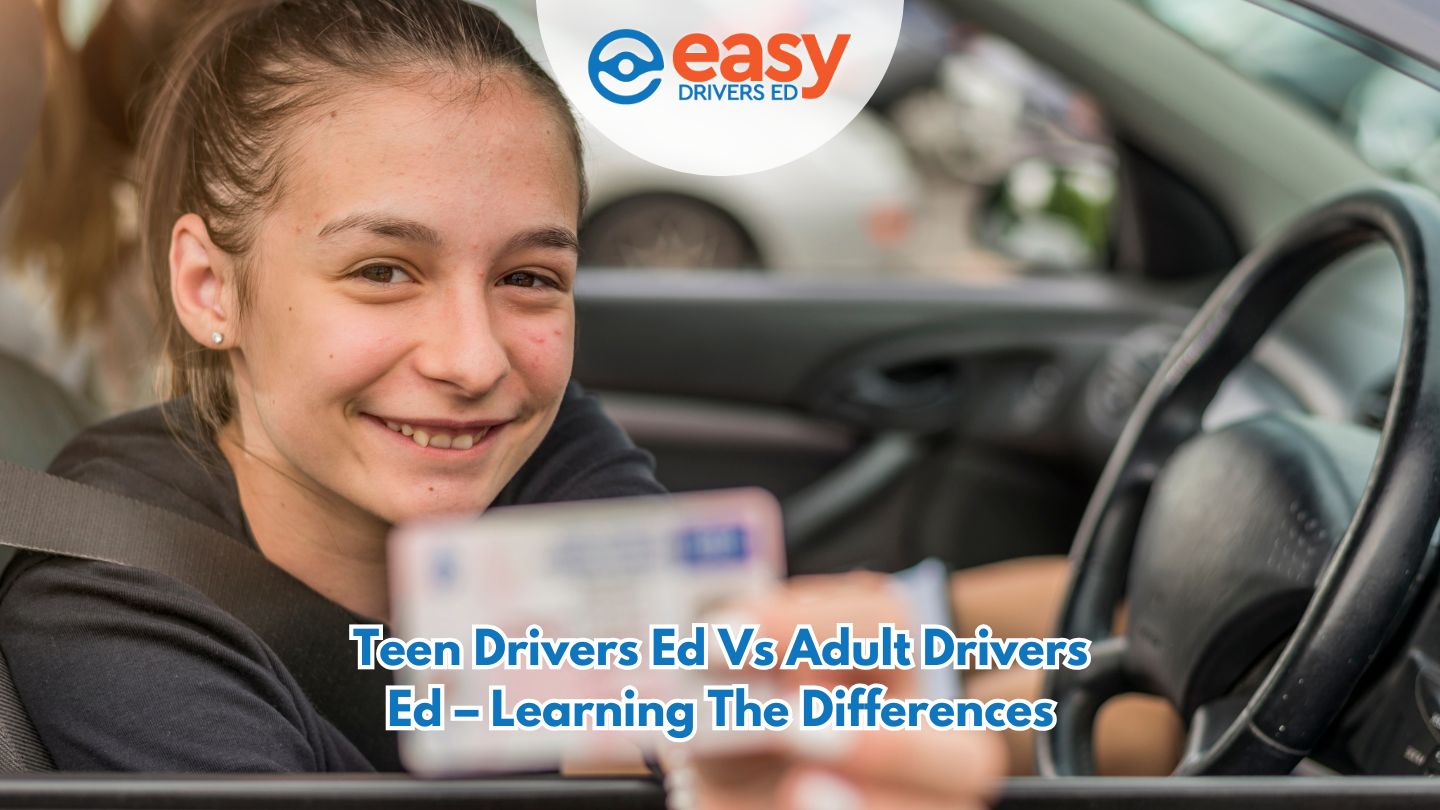Understanding the differences between teen driver education and adult driver education is crucial for selecting the appropriate driving course. Teen drivers education provides structured lessons that cater to the developmental stage of younger learners, whereas education for adult drivers is designed with a pace and flexibility that accommodates mature students. This blog will delve into these contrasting features to assist you in determining which route aligns best with your educational requirements for driving, considering age-related needs.
Key Takeaways
- Teen driver’s ed emphasizes age-appropriate learning with structured support, while adult courses focus on self-directed education tailored to busy lifestyles.
- Both courses cover essential driving knowledge, but the curriculum differs in depth and approach, with teenagers receiving interactive training and adults focusing on advanced driving techniques.
- The licensing process varies, with teens first obtaining a learner’s permit and needing formal education for progression, while adults can apply directly for a license after completing their education.
Understanding Age Requirements
The required driver’s education program in Texas is determined by the age of the individual seeking to enhance their driving skills. Teen drivers, aged between 14 and 17 years old, must enroll in a driver’s education course that caters specifically to their age group. The curriculum for these courses is segmented according to various developmental stages within this young age cohort, ensuring that it captures the interest of teen learners while remaining relevant.
In contrast, adult learners need to be at least 18 years old before they are eligible for an adult driver education course. In compliance with state regulations, Texas mandates that individuals who fall into the 18 to 24-year-old category complete a designated driving course prior to receiving their inaugural driver’s license. Although those over the age of 25 are not legally bound to undertake such a course, it still offers valuable benefits for anyone looking to refine their driving abilities and increase awareness about road safety.
Course Structure and Content
Driver’s education courses are meticulously crafted to impart vital knowledge and skills necessary for new drivers, preparing them thoroughly for the challenges of driving. The curriculum serves both teens and adults by addressing essential aspects like traffic laws, interpretation of road signs and signals, and response tactics during emergencies. This ensures all students are equipped with a robust foundation for safe driving.
The delivery methods and curriculum complexity differ significantly between courses tailored for teen learners versus those designed for adults. For teens, professional services offer structured programs with interactive methodologies, ensuring a balance between theory and hands-on driving practice. Adults benefit from streamlined, flexible courses that focus on enhancing their current skill set and updating their knowledge of modern driving practices.
Teen Drivers Ed Curriculum
Teen drivers education courses are specifically tailored to meet the unique learning requirements of young motorists. Experienced educators employ interactive methodologies that captivate teens and promote an effective educational environment. These programs frequently feature online modules, allowing learners the convenience of studying at their own pace while still acquiring critical driving skills and knowledge.
The expenditure for teen driver education can vary significantly, with prices typically falling between $200 to $800 based on the program’s location and structure. Although it may come with a significant price tag, investing in a thorough driver’s education is essential for nurturing responsible individuals who possess the aptitude to manage complex driving situations effectively. The syllabus comprises both in-class teaching sessions as well as practical behind-the-wheel training exercises, providing novice drivers with comprehensive instruction.
Engaging digital curricula forms an integral part of many teen driver education offerings, including those delivered through online platforms. Such programs utilize captivating materials and tools designed to maintain student engagement and drive high motivation levels among youths. By marrying conventional classroom lessons with cutting-edge technological aids, these initiatives strive towards fostering self-assured and competent motorists equipped for conscientious road conduct.
Adult Drivers Ed Curriculum
Courses in adult driver education are designed with the specific learning needs of mature individuals in mind, moving at a faster pace than those aimed at younger students. These programs concentrate on updating participants on current driving practices and strengthening their pre-existing skills behind the wheel, making them advantageous for adults across various age groups. In Texas, it is mandatory for adults between 18 and 25 years old to complete a driver’s education course spanning six hours to qualify for obtaining their driver’s license.
Such courses encompass foundational principles while also tackling sophisticated elements like mastering defensive driving techniques and navigating intricate traffic scenarios. They strive to equip adult learners with the assurance needed to drive safely and conscientiously throughout public roadways.
Adult learners can benefit from these courses’ adaptable nature since they accommodate varying schedules by allowing individuals to advance through lessons at a comfortable rate that aligns with personal improvement goals.
Adult driver education classes serve as valuable resources even for those already holding licenses who seek skill enhancement or adjustment amidst evolving roadway conditions. Through thorough training that underscores both safety protocols and civic duty when operating vehicles, these educational offerings work towards fostering adept motorists equipped with heightened knowledgeability when actively engaged in the control of an automobile.
Learning Environment
A key element of any driver’s education program is the educational setting provided for its participants. For teenage learners, it’s vital to have a structured learning environment that frequently includes substantial parental engagement and direction during their practice behind the wheel. Such an arrangement guarantees these budding motorists obtain the necessary oversight and encouragement as they hone their driving capabilities.
On the other hand, adult driver education courses highlight self-directed learning to suit the autonomous tendencies typical of grown-up students. This adaptability gives adults the opportunity to seamlessly integrate their driving instruction into existing commitments while allowing them to advance at a pace comfortable for them.
Structured Learning for Teens
Teen driver’s education programs thrive in a professional setting where certified instructors guide learners through both theoretical and practical aspects of driving. These instructors, backed by years of experience, are equipped to provide targeted support and address specific challenges teen drivers may face. While parental involvement is often encouraged, professional services ensure consistent oversight and expert instruction, which is critical for developing safe driving habits.
Teens participating in professional driver education benefit from tailored feedback during in-vehicle sessions and an engaging curriculum designed to foster confidence and responsibility behind the wheel. This expert guidance sets the foundation for long-term road safety.
Self-Directed Learning for Adults
Adult driver education programs emphasize flexibility and convenience, catering to the busy schedules of mature learners. Professional online platforms offer comprehensive courses with engaging materials, practice exams, and real-world scenarios to reinforce learning. Unlike a purely self-taught approach, professional courses provide structured guidance to ensure participants meet all state requirements while learning at their own pace.
The inclusion of expert-designed quizzes and curated lessons means adult learners don’t have to navigate the process alone. These courses prioritize skill enhancement and equip students with the tools needed to succeed on the road, whether they are obtaining their first license or refreshing their skills.
Permit and Licensing Process
Obtaining a driver’s license includes several essential steps that differ for teens and adults. Teens usually start their path to driving with a learner’s permit, progress through driver’s education courses, tackle written exams and accumulate experience behind the wheel. This methodical process is designed to equip young motorists with the skills needed to safely navigate the roads.
In contrast, adults may follow a condensed route toward obtaining their driving credentials. They have the option of bypassing the learner’s permit stage by completing an adult driver education course and successfully clearing both written and practical driving examinations.
The sections below will delve deeper into these distinct processes, outlining precise measures tailored separately for teenage learners and adult aspiring drivers.
Teen Learner’s Permit and License
Professional driver education programs simplify the licensing process for teens by providing all the necessary training and guidance to navigate the state requirements. Certified instructors guide students through classroom and behind-the-wheel training, ensuring they are well-prepared for the learner’s permit test and road examinations. Teens receive the required DE-964 certificate through an accredited provider, ensuring a seamless progression toward obtaining their driver’s license.
Emphasis is placed on safety, awareness, and understanding of traffic laws, with professional programs preparing teens to confidently handle real-world scenarios.
Adult Permit and Licensing
Adults benefit from professional education that eliminates guesswork and streamlines the licensing process. State-approved courses help adults meet mandatory requirements, offering step-by-step guidance to complete both the written and practical driving exams. These programs provide targeted training that focuses on defensive driving, navigating complex traffic patterns, and ensuring compliance with current traffic laws.
By relying on professional services, adults gain a clear path toward securing their licenses while improving their driving confidence and competence.
Flexibility and Convenience
Flexibility and convenience are significant factors when choosing a driver’s education program. Online courses offer a modern solution for both teens and adults, providing a flexible and accessible way to complete driver’s education. These courses are designed to be interactive and engaging, making the learning process enjoyable and effective.
For teens, online driver’s education courses offer the flexibility to learn at their own pace while still receiving comprehensive instruction. For adults, the convenience of online courses allows them to fit their education into their busy schedules.
The following subsections will explore the specific benefits of online courses for both teens and adults.
Online Courses for Teens
Teen drivers can take advantage of online driver education courses, which offer a flexible and affordable route for completing their driver education. Such online courses are typically priced at around $49.95 and provide 30 hours of instructional content. There may be additional fees for behind-the-wheel instruction despite these costs. The convenience and accessibility provided by these digital platforms make them a popular choice among busy teenagers.
A comprehensive course in teen driver’s education often falls within the price range of $300 to $800, varying based on the services included in the package. There is also variability in packages that cater to behind-the-wheel training, with different offerings such as 6 to 10-hour sessions tailored to meet individual student requirements.
Designed with interactivity in mind and optimized for mobile devices, these online driver education courses facilitate engaging learning experiences while offering exceptional adaptability to suit young individuals’ dynamic lifestyles.
Online Courses for Adults
Driver education for adults has become increasingly accessible through online driver education courses that provide the utmost convenience. These digital learning options allow adult drivers to pursue their driver’s education on their own terms, fitting sessions around personal and professional commitments by accessing material from any location with internet connectivity.
The economic benefits of choosing online driver education are significant. These online programs frequently present a more affordable alternative to conventional classroom instruction due to minimized overhead costs associated with physical facilities.
With tailor-made quizzes and practice exams incorporated within the curriculum, these online courses adapt well to various paces of learning. They offer thorough educational experiences designed specifically for adult learners who require flexibility without sacrificing quality in their pursuit of driving knowledge.
Focus on Safety and Responsibility
Driver education prioritizes safety and responsible conduct for teens and adults alike. Mastery of vehicle handling, comprehension of legal responsibilities, and awareness of road safety are crucial pillars in driver training programs. These aspects are stressed equally in courses tailored for both teens and adults to guarantee that every driver acquires the skills needed for safe and accountable driving on public roads.
Subsequent sections will explore the particular practices related to safety covered in driver education classes designed specifically for teens and adults. Whether it’s fostering secure driving patterns among teenagers or instructing mature individuals in defensive driving maneuvers, these educational initiatives significantly contribute to enhancing public welfare by encouraging prudent behavior behind the wheel from all drivers, regardless of age.
Safe Driving Practices for Teens
Teen drivers education programs place great emphasis on cultivating safe driving habits among young motorists. These initiatives are led by seasoned instructors dedicated to training teens in the art of handling distractions and making prudent choices when operating a vehicle. The curriculum delivered through classroom instruction encompasses vital subjects such as defensive driving strategies, comprehension of traffic laws, vehicular safety features, and overarching principles of driver’s education—all crucial elements in shaping conscientious drivers.
By arming teen learners with the skills necessary to predict varying road situations, shun potential disruptions, and modulate their velocity appropriately, these courses strive to greatly diminish the likelihood of accidents occurring. Through structured teaching methods that emphasize personal responsibility and strict observance of traffic regulations, these programs nurture a tradition of secure driving practices destined to persist over the entire span of their driving experiences.
Defensive Driving Techniques for Adults
Adult driver education encompasses vital defensive driving techniques that significantly contribute to bolstering road safety. This training emphasizes the reinforcement of fundamental traffic regulations, boosts driver attention, and promotes refined driving practices. Consequently, it fosters safer conduct behind the wheel by heightening vigilance and prompting adults to make wiser decisions when driving.
Engagement in reputable adult driver education can yield financial benefits through reduced car insurance costs over time since numerous insurance providers reward individuals who partake in these structured educational programs. Such incentives not only advocate for enhanced roadway security but also offer economical motivations for adults eager to elevate their proficiency and behavior as responsible motorists.
Cost Considerations
Recognizing the financial implications of driver’s education is essential for adult drivers and teens, as it affects their choices in educational programs. The expenses related to both teen and adult drivers consist of charges like course fees, behind-the-wheel instruction, and test fees for obtaining a permit. Depending on where you are located, which course you select, and who provides it, these costs can vary greatly.
In upcoming segments, we will delve into the distinct cost elements pertinent to driver education programs for both adults and teenagers. By becoming aware of the principal variances in expenditures between courses tailored to teens versus those designed for adults – learners can make well-informed decisions about their driving training that align with their unique requirements.
Pricing for Teen Drivers Ed
Professional driver education programs for teens offer various packages that reflect the level of service and training included. These programs deliver significant value by combining state-approved curricula with expert instruction.
Comprehensive packages often include classroom training, behind-the-wheel sessions, and access to engaging online materials. These services ensure teens are thoroughly prepared for the challenges of driving while fulfilling state requirements.
Pricing for Adult Drivers Ed
For adults, professional education services provide flexible and accommodating options that meet diverse needs. Online courses, which are frequently more cost-effective than in-person alternatives, offer tremendous value, particularly when bundled with defensive driving modules or additional practice tools tailored for adults seeking to refine their skills.
Such structured programs provide not only convenience but also the confidence of knowing participants are fully prepared to meet licensing requirements.
Completion and Certification
Securing a completion certificate is an essential phase in the driver’s education course for both teens and adults. Teens must obtain this certificate to be eligible for their learner’s permit and, eventually, their official driver’s license. The certificate acts as verification that they have successfully completed all mandated educational requirements, marking them ready to advance in acquiring their license.
For adults partaking in a driver’s education course, receiving the completion certificate is of equal significance. After finalizing the course requirements, adults are provided with this certificate either through email or available for download. It’s necessary when applying for a driving license.
The subsequent subsections will outline the precise procedures needed by teens and adults alike to procure driver’s education completion certificates.
Teen Drivers Ed Completion Certificate
After completing the initial module of their Texas Driver Education, teenagers can acquire their Certificate (DE-964) directly from the course dashboard by downloading it. This certificate is automatically refreshed during registration to make sure that all essential details are correctly included, such as information pertaining to the teen’s Texas driver’s license.
In order to successfully complete the driver education course, teens must provide transfer information and choose whether they prefer transferring classroom hours under a licensed instructor or opt for parent-taught instruction. This step guarantees that teenagers obtain the thorough training needed to evolve into conscientious and safe drivers.
Adult Drivers Ed Completion Certificate
Upon completing the mandatory components of the driving safety course, adults are eligible to either have their completion certificate emailed to them or download it in PDF format. This certificate will carry a distinct number and must be submitted to the Texas Department of Licensing and Regulation (TDLR) within a five-day period following its issuance.
Once they secure the DE-964 form, adults can proceed to apply for a permit at their nearest Department of Public Safety (DPS) office and arrange an appointment for their driving test. Successfully navigating this process is crucial as it equips adults with the requisite certification needed to advance toward acquiring their driver’s license.
Summary
Teen Drivers Ed and Adult Drivers Ed programs are tailored to meet the specific needs of their respective audiences. Teenagers benefit from structured, instructor-led programs that lay a solid foundation for safe driving habits. Meanwhile, adults enjoy the flexibility of professionally designed courses that fit seamlessly into their busy schedules. By selecting comprehensive, state-approved driver education services, learners of all ages can acquire the skills and knowledge required to become responsible, confident drivers.
At EasyDriversEd, we specialize in offering adult driver education in Texas, providing accessible and effective instruction that empowers individuals to achieve their driving goals. Our programs are crafted to ensure that every driver, regardless of age, receives the education they need to drive safely and confidently. Ready to get started? Contact us today!
Frequently Asked Questions
1. Can I switch from a teen driver’s ed course to an adult course if I turn 18 during the process?
Yes, but it depends on your state’s regulations. Generally, you can transition to an adult driver’s ed course after turning 18 as long as it fulfills your state’s licensing requirements.
2. What should I do if I don’t pass the written test after completing a driver’s ed course?
If you don’t pass the written test, most programs allow you to retake it after a short waiting period. You can review the course materials or practice with mock exams to improve your understanding before retaking the test.
3. Are online driver education courses as effective as in-person classes?
Yes, online courses are designed to be equally effective, offering interactive materials and practice tests. They provide flexibility while still covering all the essential topics required for safe driving.




